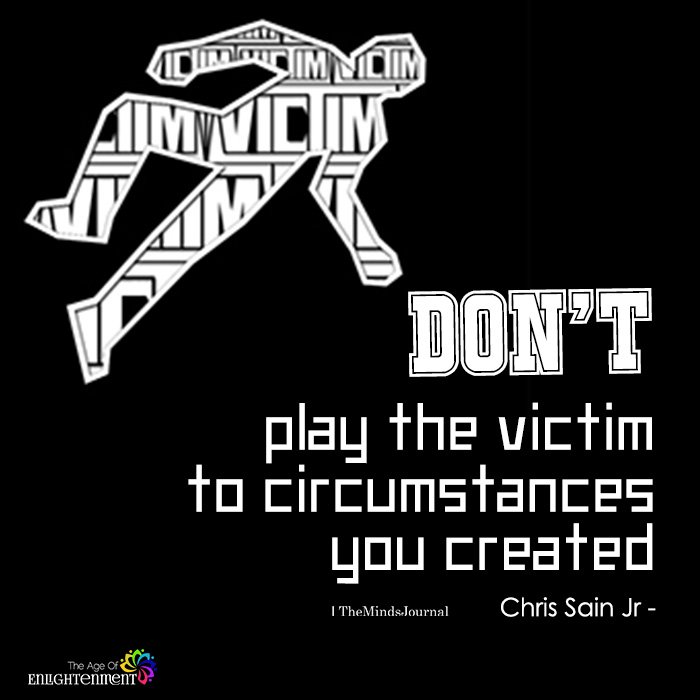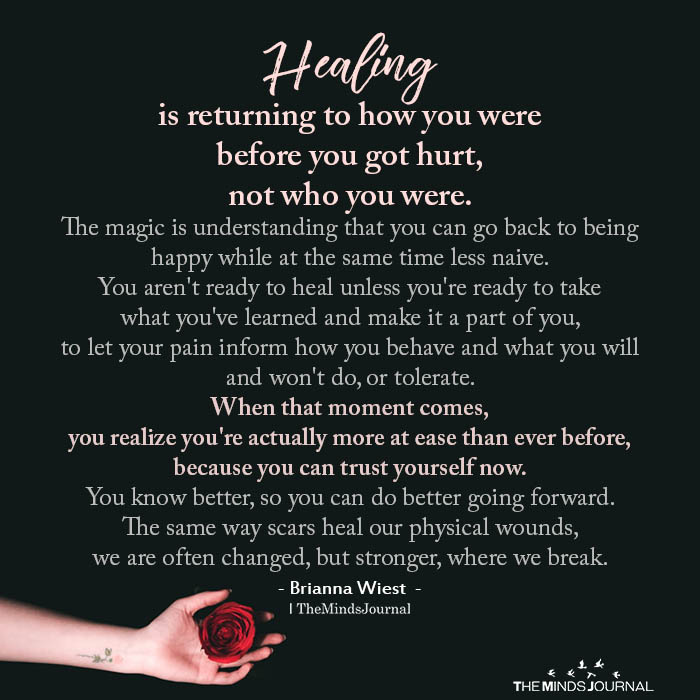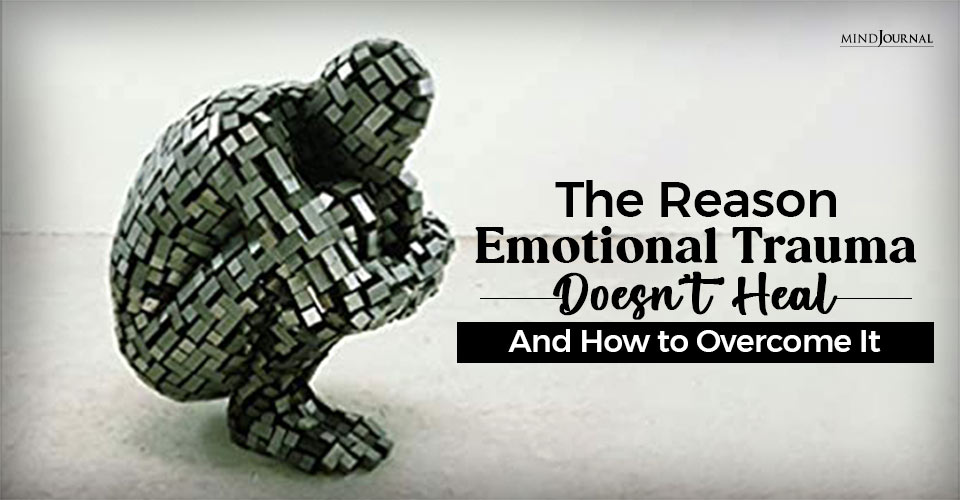Have you ever wondered why it’s so difficult to heal emotional trauma? Well, believe it or not, unhealed emotional trauma is usually not the result of a past event, nor another person’s abusive actions, but, rather, the result of what we do to ourselves on a daily basis.
The Wrong Approach
In response to emotional trauma, it’s common to protect ourselves by shutting down and dissociating, but, over time, this can turn into chronic dissociation, which is simply a fancy way of describing self-abandonment. Whenever emotional trauma does not heal, self-abandonment is always the core wound.
Despite how it might seem or feel, no one can ever hurt us as deeply as we hurt ourselves, and, in fact, we can heal from external abuse, but we cannot heal from self-abandonment. By abandoning ourselves, we become emotionally fragmented, and once feeling “not whole,” we experience a pervasive sense that something is missing.
Abandonment of oneself is immeasurably worse than being victimized or rejected by the entire world. Not only is the emotional pain devastating, but self-abandonment also creates deep scars that can last a lifetime, and unlike other emotional wounds, time does not heal this wound!
Therefore, there’s no way around it; to feel like your whole self once again, you must stop abandoning yourself now – and it’s never too late!
Related: Self-Abandonment: 3 Ways You Are Abandoning Yourself
What Does It Mean To Abandon Yourself?
Here are some of the most common means of self-abandonment:
1. Holding disempowering beliefs about yourself, such as unworthiness, powerlessness, and victimhood.
2. Practicing chronic self-judgment, negative thinking, or suicidal ideation.
3. Hiding self-expression, denying your dreams and desires, or not speaking your truth.
4. Staying in a relationship or job past its expiration date, not trusting yourself to follow inner guidance, or practicing self-deprecation.
5. Abusing your body by ingesting toxins or not giving yourself proper nutrition, rest, movement, sleep, nurturing, etc…
6. Compromising your integrity by doing things you don’t want to do, making choices out of obligation or guilt, or putting yourself last to please others.
7. Suppressing your feelings, neglecting emotional needs, or allowing others to disrespect or abuse you.
Keep in mind that many of us were abandoning ourselves prior to trauma, and, in many cases, we learned it from our parents, and it’s been passed down from generation to generation. So, whether we realize it or not, trauma is often a physical manifestation of the feelings, beliefs, and behaviors we have toward ourselves.
How To Stop Abandoning Yourself?
Since the relationship you have with yourself sets the foundation for healing, you must stop abandoning yourself in all ways, and this means that healing requires a new paradigm of self-love and self-care.
Before anything else, your number one job is to take care of you, and, no doubt, this is impossible to do while abandoning yourself. Therefore, start listening to inner guidance, drop self-judgment, and give yourself the emotional needs you desire from others, such as acceptance, approval, appreciation, respect, etc…
Moreover, while releasing situations and relationships that no longer support you, speak your truth and practice self-expression, and as you carefully nurture your body, consciously choose to be here, and this means to choose life!
Since you first abandoned yourself when you disconnected from your feelings to “un-abandon” yourself, you must be willing to feel your feelings. Emotions surface to be released, but they can only be released through the process of feeling. And, last but not least, it’s essential to give up disempowering beliefs, such as unworthiness, powerlessness, and victimhood.
Although it might be common to abandon yourself when you’re afraid, confused, or not being who you want to be, make a conscious choice to stay connected. Therefore, when current issues arise, do not “turn on yourself” with self-judgment, damnation, or deprecation. Instead, listen to yourself, feel your feelings, speak your truth, and take a stand when appropriate, and be your own best friend.
During challenging experiences, you might say to yourself, “You’re doing the best you can, and no matter what feelings arise, I am here for you, and I will not abandon you!”

Remember To Save Your Past-Self!
The word “healing” means a return to wholeness, and this means that, in order to heal, you must embody your whole self.
If you abandon any aspect of yourself, for any reason, healing is prolonged. Therefore, even if you practice self-love diligently, as long as you judge your past-self, or your memories induce shame, you are still abandoning yourself (this includes your past self who experienced trauma as well as any version of your past-self).
Since you cannot fool your subconscious mind, you cannot feel good about your current self while pretending your past-self is damaged or separate.
The problem is not that you abandoned yourself at the time of trauma. The problem is that you keep doing it! Therefore, to fully heal, you must save your past-self from abandonment. Since the subconscious mind does not know the difference between past and present, nor real and imagined, you can mentally go back in time and embrace your past-self with love and compassion.
However, it can be difficult to save your past-self when traumatic memories make you cringe or you judge your past-self for the things you did – or didn’t’ do. When this is the case, it’s time for greater understanding.
So, let’s be honest; if you now have the wisdom to do things differently, and make better choices, you owe it to your past-self.
Related: The Healing Power of Telling Your Trauma Story
Forgiving
No matter the mistakes or errors in judgment, your past-self not only survived pain and trauma but he/she also forged the path that you walked. Despite the fear, shame, loneliness, and even lack of support, your past-self not only endured difficult experiences, your past-self learned from those experiences and evolved into who you are today.
So, forget about forgiving your past-self because there’s absolutely nothing to forgive.
Instead, why not celebrate triumph over trauma by acknowledging the everlasting gifts, lessons, and opportunities, and start seeing your past-self in a different light? Although we might need to search quite deep before we find the treasures born from trauma, they always exist.
Indeed, a perfect pearl may reside in an ugly shell, but, if you don’t open it, you’ll never find it.

So, Who Would You Be Today Without Your Past-Self?
Maybe, for instance; by facing adversity, you developed strength, by speaking your truth, you found your voice, by taking responsibility, you became independent, or, just, maybe, by overcoming powerlessness, you became empowered!
By expressing gratitude for the arduous journey endured and the priceless gifts received, your past-self receives your unconditional love, and, no doubt, when it comes to healing, self-love is the ultimate cure!
With love, grace & gratitude,
Nanice
Copyright: Nanice Ellis 2019. All rights reserved
Written by Nanice Ellis Originally appeared in Wakeup World












Leave a Reply